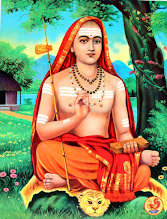Select verses 1 to 3
Vivekachudamani is a popular prakarana grantha by
Sri Aadhi Sankara, whom we shall refer to as Sri Sankara, that expounds Advaita
Vedanta philosophy in detail. A few western
commentators like Alston and Comans have disputed the authorship of
Vivekachudamani as ascribed to Sri Sankara in view of difference in style as
compared to his commentaries on Prasthanatraya. But there is a general agreement among many
others that Vivekachudamani is an ancillary treatise of Sri Sankara addressed
to different audience with a specific emphasis and purpose. In this connection Swami Dayananda Saraswathy
observes “―I do not think we lose anything even if the authorship is
attributed to any other Sankaracharya of one of the various Sankara-mathas.“ For Vivekachudamani, meaning
‘the crest jewel of discrimination’, remains a vade mecum of
quintessential Advaita Vedanta theory and practice.
This is a fairly big work of 580 verses of which 108 were selected by Swami Dayananda Saraswathi and Swami Paramarthananda for their talks. My blogs on Vivekachudamani will be based on these selected verses only. The verse no. in the original text is given along with the verse and verse no. in the selections is given before the verse.
The
text opens with mangalacharanam, an auspicious invocation, for the sake
of successful completion of this work.
Verse:1
sarvavedantasiddhanta-gocharam tamagocharam |
Govindam paramanandam, sadgurum pranato’smyaham ||1||
My salutations to Sat-Guru Govinda who is limitless and is of
the nature of Bliss Supreme, who is beyond the reach of the known instruments
of perception and who can be known only through the import of the essence of
Vedanta
Here Govinda refers to Lord and also to Sri Sankara’s guru, Sri Govindapada. So Sri Sankara is offering salutations to his guru as well as to the Lord seeking their blessings for the successful completion of the text. Further the real nature of guru, like that of the Lord, is Brahman only. And Brahman is infinite; cannot be objectified by the senses; can be known only through the study of the Upanishads and is of the nature of Sat, Chit, Aananda.
Verse:2
durlabhaṃ trayamevaitad, devanugrahahetukam |
manushyatvam, mumukshutvaṃ, mahapurushasamsrayah ||3||
Very rare indeed are these
three things and happen only due to the utmost Grace of God—a human birth, a
burning desire for liberation, and the blessed refuge of an illuminated sage.
Human beings only of all the creatures have the free
will, which helps them to pursue all the four Purusharthas that includes
Dharma and Moksha. So birth as a human being, Manushyatvam,
is considered as a blessing of the Lord.
Of those born as human beings only few develop a burning desire for Moksha.
This burning desire for Moksha is called Mumukshutvam and the one
who has this desire is called a mumukshu. Moksha can be gained only
through Self-knowledge and Self-knowledge can be acquired only through the
study of scriptures under the proper guidance of an enlightened Guru who has
the knowledge of the sastras as well. Such a Guru is called Mahapurusha
in this verse. So this three-fold accomplishment of Manushyatvam,
Mumukhutvam and the discipleship under a Mahapurusha, for a jiva
is described as special blessings due to the Grace of the Lord.
Verse: 3
labdhva kathancinnarajanma durlabham,
tatrapi pumstvam srutiparadarsanam |
yassvatmamuktyai na yateta mudhadhih,
sa hyatmaha svam vinihantyasadgrahat ||4||
Is there a man who, having somehow obtained this rare human birth, together with masculine temperament and also a complete knowledge of the scriptures, is foolish enough not to strive hard for Self-realisation? One verily commits suicide, clinging to things unreal.
In this verse Sri Sankara criticises the person, who with the advantages of human birth, a subtle intellect and academic scholarship in scriptures, does not strive for Self-realisation. Wasting the advantages that this person has got by not pursuing the fourth Purushartha of Moksha is akin to squandering the human birth. So Sri Sankara calls him a dull fool and compares his lack of enthusiasm to strive for Moksha, to committing suicide. Swami Chinmayananda comments “One can get a Doctorate in Foolishness if one does not utilize such a rare opportunity to make rapid spiritual progress.” In this verse masculine temperament is to be interpreted as emotional strength or freedom from emotional complexes, a quality that will be of great help in practicing detachment, if he chooses to.

No comments:
Post a Comment